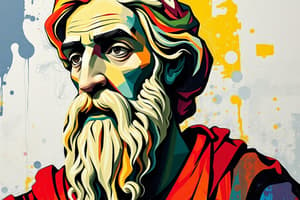Podcast
Questions and Answers
Who is often considered the father of Western philosophy?
Who is often considered the father of Western philosophy?
Socrates
Socrates believed that self-knowledge is the key to enlightenment.
Socrates believed that self-knowledge is the key to enlightenment.
True (A)
What did Socrates famously declare?
What did Socrates famously declare?
- To thine own self be true.
- Knowledge is power.
- Life is a journey.
- The unexamined life is not worth living. (correct)
According to Plato, what are the two parts of the self?
According to Plato, what are the two parts of the self?
What metaphor does Plato use to describe the soul?
What metaphor does Plato use to describe the soul?
According to Aristotle, the self is a harmonious integration of reason, emotion, and perception.
According to Aristotle, the self is a harmonious integration of reason, emotion, and perception.
What term did Aristotle use to describe a fulfilling life?
What term did Aristotle use to describe a fulfilling life?
How does Aristotle define the soul?
How does Aristotle define the soul?
Flashcards are hidden until you start studying
Study Notes
Socrates
- Regarded as the father of Western philosophy, emphasized self-reflection and critical thinking.
- Asserted "the unexamined life is not worth living," highlighting the necessity of scrutinizing one’s beliefs for personal growth.
- Encouraged dialogue as a tool for individuals to achieve knowledge and self-understanding.
- Proposed “Know thyself” as a central philosophical goal; knowledge of self leads to enlightenment and true bliss.
- Suggested mastery over oneself is a sign of strength, contrasting it with the force needed to master others.
- Advocated that only through self-knowledge can misery be eradicated and true perfection be attained.
Plato
- Defined the self as comprising the rational soul and irrational appetites, using the charioteer metaphor to illustrate this dynamic.
- Proposed that the rational soul seeks truth and virtue, while irrational appetites can lead to ignorance and moral failure.
- Adopted a dualistic view of the self, positing an immaterial soul that perceives true knowledge beyond physical limitations.
- Illustrated three components of the soul: reason, appetite, and will, with conflicts arising when these parts are misaligned.
- Emphasized the social aspect of humanity, highlighting interdependence and the importance of relationships for personal well-being.
Aristotle
- Described the self as a harmonious integration of reason, emotion, and perception, crucial for achieving eudaimonia (flourishing).
- Stressed that self-awareness is essential for moral and intellectual development, enabling recognition of strengths and weaknesses.
- Defined the soul as the essence of a living being; argued against its separateness, claiming it is an activity of the body.
- Asserted that rational activity is fundamental to human essence, emphasizing that self-development should encompass all faculties.
St. Augustine
- Merged Christian theology with philosophy to investigate the nature of the self.
- Viewed the self as inherently flawed due to original sin, stemming from Adam's transgression.
Studying That Suits You
Use AI to generate personalized quizzes and flashcards to suit your learning preferences.




